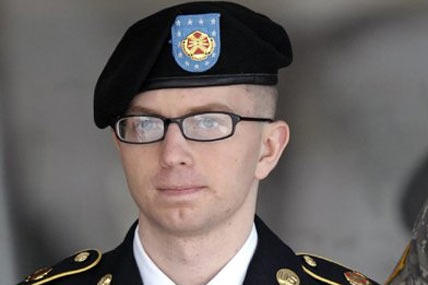U.S. Army Pfc. Bradley Manning will return to a military courtroom Wednesday facing up to 136 years in jail after he was convicted of espionage charges Tuesday. However, he will not face life in jail without parole after the judge acquitted him of aiding the enemy -- the most serious of the 21 charges.
Manning’s defense attorney David Coombs told supporters at Fort Meade, Md., after the verdict was read that “we won the battle, now we need to go win the war,” referring to the sentencing phase of the trial.
Unlike most civilian courts, sentencing hearings typically start immediately following a verdict in a court-martial. Military lawyers who have watched this case told Military.com that plenty is yet to be determined in terms of Manning’s fate and the precedent that will be set by this case.
Army Col. Denise Lind, the judge in the case, convicted Manning on 19 of 21 charges, including espionage and theft three years after Manning handed over classified information to WikiLeaks, a website founded by Julian Assange. WikiLeaks then posted the information on the Internet.
Manning collected and distributed to the website more than 700,000 battlefield reports and diplomatic cables, as well as a video of a 2007 U.S. helicopter attack that killed civilians in Iraq. The pilots in the film referred to the targets as “dead bastards.”
Legal observers have closely monitored this case, which has received international attention as military lawyers expect it will set legal precedents that could dictate rulings in future cases that involve leaking classified material.
In fact, experts believe Lind’s ruling could lead to charges brought by the U.S. against Assange. Manning’s verdict was also read as Edward Snowden remains stranded in a Moscow airport after he revealed classified details on National Security Agency surveillance programs.
“We don’t have any other cases to compare it with,” said Gary Myers, a military lawyer who served as an Army judge advocate general and was a defense counsel in the Abu Ghraib prisoner abuse trials.
The prosecution faced a considerable challenge in proving that Manning deliberately aided a specific enemy, Myers said. Providing classified material to the media is different than “if he had gone to the Pakistan embassy” with documents in hand, he explained.
The prosecution “simply overcharged the case and now the headline is that they failed to win conviction on the headline charge,” said Charles Gittins, a retired Marine officer and former judge advocate and civilian defense counsel.
Gittins commended the defense presented by Coombs, saying he made “many good choices,” to include his request for special findings that could provide Manning’s defense with fodder for an appeal. A request for special findings means the judge must put her reasoning for the offenses on the record.
“While an unlikely prospect, if she misapprehends the law or misinterprets it, or does not correctly apply the facts from the record in those special findings, it leaves Manning fertile ground for appeal,” Gittins wrote in an email to Military.com.
Following sentencing, Manning and his lawyers intend to appeal the case first to the Army Board of Criminal Appeals and, if that fails, to the Defense Department’s court of appeals, according to Nathan Fuller, spokesman for the Bradley Manning Support Network.
Manning’s lawyers will continue to try and prove during sentencing that the classified information leaked by Manning caused minimal harm to U.S. and coalition troops, the lawyers said.
The lead prosecutor, Maj. Ashden Fein, said Manning knew the material would be seen by al-Qaida, a key point prosecutors needed to prove to get an aiding the enemy conviction. Even Osama bin Laden had some of the digital files at his compound when he was killed.
Manning said during a pre-trial hearing in February that he leaked the material to expose the U.S military's "bloodlust" and disregard for human life, and what he considered American diplomatic deceit. He said he chose information he believed would not the harm the United States and he wanted to start a debate on military and foreign policy.
He did not testify at his court-martial.
William Ferris, a civilian military lawyer who retired from the Navy, said having the judge and not members of a court-martial determine sentencing could lead to a lesser sentence.
“I would say that in the federal judiciary there is an opinion that judges tend to be more lenient than jurors would be,” Ferris said in regard to sentences handed down by judges, while also pointing out that military and civilian courts differ.
Ferris said he was surprised that Coombs chose to have Manning’s court-martial judged by a judge alone rather than members, or what’s known as a jury in a civilian court.
He said he’s always requested members rather than a judge alone. In a general court-martial, the prosecution must convince two-thirds of the members the defendant is guilty. In a civilian court, the prosecution must convince the entire jury.
“Most trial lawyers when dealing with serious charges are inclined to say I want members,” Ferris said.
Gittins was also surprised by the selection of the judge, but commended Coombs for making it. He said selecting the judge prevents any possible misunderstanding of the instructions in the case. Gittins said he expected members or a jury to convict Manning.
“Manning is a relatively unsympathetic accused, and I think a panel would have convicted him of the headline charge and he would now be facing life without parole,” Gittins said.
“He may still get a substantial confinement sentence from the military judge,” Gittins said. “But his eligibility for military parole now is assured, and we have not yet seen the mitigating evidence his attorneys have mustered.”
-- Bryant Jordan and the Associated Press contributed to this report.





























